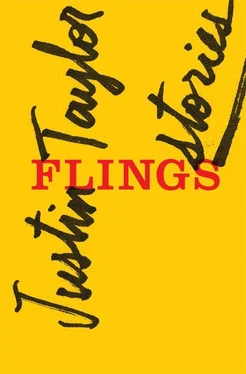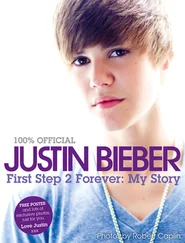If she wakes you you might take her out to breakfast. That’d be nice, but it’d also mean at least an hour of chitchat. She starts to look for your wallet or a piece of mail, anything with your name on it, then changes her mind and decides to bail. Better to be mysterious. If you’re even halfway interested in her you’ll ask Caleb for her number. Speaking of which, her phone’s battery apparently ran out of juice at some point last night. Oops.
The plows have already come through; snow piles stand waist-high. The stretches of sidewalk between the driveways are like little canyons. Her heels click on that synthetic salt stuff they throw down. The gutters aren’t even muddy yet; it hasn’t been light out long enough. Everything looks pure in that superficial way. Snow.
She sees a cab and hails it, gets in, fastens her seatbelt, then gives him the address. If she’d told him first he’d have peeled out and left her standing there. He shakes his head, about as annoyed as she expected, but punches the address into his GPS and pulls back into traffic. He resumes his conversation — in Gujarati or whatever — with whoever’s on the other end of the Bluetooth clipped to his left ear. She puts her forehead against the cold window. Looking at all the early commuters and other cars and changing scenery is nauseating. She shuts her eyes and tries to lose herself in the hum and shake of the car. She’s dozing but only lightly, having one of those dreams about being exactly where you are.
Candi has the keys to her sister’s place but knocks before she lets herself in. Taya is standing in the hall where it meets the kitchen — these Windsor Terrace brownstones, you get space out here — holding her daughter, Emily, on a cocked hip. Taya takes one look. “Where did you sleep last night?”
Over coffee, Candi tells her story, embroidering as she goes — what everyone was wearing, what the coke must have cost, the whole backstory of why Lindsey slapped her. She fills in the big gaps with lurid surmises and fibs. In her telling, you get six inches taller, are wearing brands Caleb favors (you’ve never heard of them), and are the bassist in Gene’s band. Taya’s pitch-perfect in her big-sister act: mildly disapproving but also obviously jealous — everything Candi hoped for. Her sister is the best.
They decide to call their mother, who lives upstate and is always going on about some new herbal weight-loss drug she ordered off the TV. “You won’t be young forever, girls,” her mother likes to say in this evil little singsong, and ain’t that the truth? Though the lesson Candi takes from the admonition is not to stock up on diet pills and join a Pilates class but rather to get her kicks in while she can.
After Emily talks to Grandma she says she wants to go to the park. Taya says it’s too cold to go but Emily won’t stop talking about it, so Candi says she’ll take her and they get the kid dressed. Candi, too — she roots around in her sister’s closet. Their sizes run close enough. Taya says she’ll bake banana bread while they’re gone.
“Oh, I almost forgot, I need to charge my phone.”
“No prob. I’ll plug yours in and you can take mine just in case.”
At the playground, the swings and slide have been mostly erased by the snowfall. Emily’s zipped up and insulated, crash-proof, so Candi lets her go wild among the vague shapes. A flyer taped to a streetlight reads, REJOICE — YOU ARE A REALLY SPECIAL PERSON IN THE HEART OF GOD AND HIS PERFECT PLAN HAS A UNIQUE PLACE IN IT JUST FOR YOU. She pulls her sister’s heavy coat tight around herself, plunges into the snow to catch up with her niece.
Danielle had her days to herself and half the summer still in front of her. A Fodor’s guide and a debit card called the Octopus, Hong Kong’s version of a rail pass, but you could use it in cabs, too, and even some stores. She ate noodles in steaming broth at the last dai pai dong in Wan Chai, was given scissors to shell squillas with at a food stall in North Point Market. She slurped xiao long bao — soup dumplings — at the Victoria Harbour Restaurant in what had once been a waterfront property but now, thanks to the ongoing “harbor reclamation” project, was several bustling city blocks inland from its namesake. Everywhere she looked, it seemed, new buildings were being constructed while old ones were under renovation or being razed. The city never stopped changing, never slowed. Hong Kong truly was the city that New York claimed to be, she thought, a bit guiltily, even though she hadn’t exactly meant it as praise. She could not accustom herself to the sight of the lashed bamboo they used for scaffolding here, but at least the workers didn’t catcall, or if they did their words were lost in the language gap, as were most billboards, street chatter, and whatever was on the radio in a given taxi or store. So many pretty colors, so much white noise.
Cold air blasted from the open-faced storefronts as she made her way along Nathan Road, Kowloon’s main tourist drag. She was awed by the flagrant waste even as she moved to the inside of the sidewalk to make sure she didn’t miss a single hit of chill. She imagined electric bills in quantum notation. She rode the funicular, the ding-ding, the double-decker bus out to Shek O once, but never the red-and-green minibuses; those things were death traps, her father had warned: the worst.
She went to the historic markets — bird, flower, fish, and jade. She stood in front of the Chungking Mansions, let the hustlers’ pitches wash over her. She did not want to follow them to where their knockoff purses and watches were cached. She did not want to eat at their brothers’ food stalls. She stood on the viewing platform on the roof of the mall at the Peak. She went to the racetrack in the Happy Valley and bet on the horses with the names she liked best: Bespoke Master, Cars King Prawn. In the high distance beyond the grandstand, above the colonial cemetery, stood a pair of blue-glass residential towers everyone called “the chopsticks.” They looked like twins but weren’t.
She spent an afternoon at the JCC on Robinson Road. They had a library and were happy to let her use it even though she wasn’t a member. Danielle read about the prominent families, Sassoons and Kadoories, how they came over with the British from Baghdad and owned merchant shops and founded charities and later opened the Peninsula Hotel. She read about the Axis occupation, how most Jews fled to Shanghai and the island’s oldest synagogue was turned into stables and all the British subjects were sent to prison camps. She shared these stories with her father over dinner at a Lebanese restaurant, their first proper meal together in three or four days.
“Did you know that Nathan Road is named for the first Jewish governor of Hong Kong?” Danielle asked. She did not mention that in the ninety years between Sir Matthew Nathan’s reassignment to South Africa and Hong Kong’s return to Chinese control there had never been another Jew in charge. Her father had always enjoyed history, and over the years had developed a bombastic pride in his heritage — this despite a near-perfect indifference to its teachings or practice. This was common among Jewish men in their late middle age, Danielle thought; she had many friends whose fathers had done the same. Stan Ross seemed to believe he held claim to a share of the credit for anything any of their people had ever accomplished, individually or collectively, including living in a given place for any length of time without being annihilated or kicked out. Which is why the Jewish history of Hong Kong had seemed like such a promising topic, the very thing to draw him out of what Danielle took to be his abiding stoicism, a term she preferred to the other options that suggested themselves: reticence, dissatisfaction, boredom, gloom. But she hadn’t anticipated that they’d be having the conversation in this particular venue. A Lebanese restaurant might well be the den of the enemy, for all they knew, though the artwork on the walls suggested Coptic Christianity, which in turn probably meant these people were more rabidly pro-Israel than even her father was. Still, he wasn’t certain, and said he meant to maintain his ignorance so he could keep eating here in good conscience, or at least not in bad. There were a hundred places to get shawarma in Hong Kong but this one was his favorite; they had a house-made spicy ketchup that he all but ate straight with a spoon. His suit jacket hung on the back of his chair. He’d taken his gold cuff links out, rolled his sleeves up almost to his elbows.
Читать дальше












